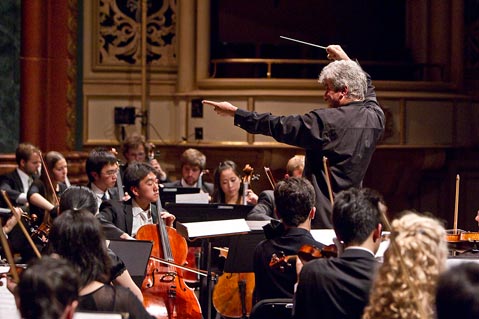Music Academy Season Preview
Richard Feit Lays Out the Logic Behind the Music

One of the greatest pleasures in any Music Academy of the West season is listening to Richard Feit, the vice president for artistic programs and operations, talk about how and why the various pieces scheduled for performance were chosen. This week we will hear about the first three orchestral concerts and some of the other changes that have been made to the way that the summer’s experience is organized. Look for the conclusion of this preview in next week’s Independent.
For the first orchestral concert, you’ve paired a shorter piece by Richard Strauss, “Till Eulenspiegel,” with the Symphony No. 1 of Brahms. What’s the logic? The tone poems of Richard Strauss are wonderful for the opening night of the orchestra season because they allow the musicians to become a community, and they often have bits that would be appropriate at an audition for a seat in an established professional orchestra. For example, the young man who will play the horn—his solo at the opening of “Till Eulenspiegel” is just the kind of thing he might be asked to play in an audition for the Los Angeles Philharmonic. The piece is challenging enough without being overwhelming, especially since Larry Rachleff and the musicians have just a few days to prepare it.
With the Brahms Symphony No. 1, the musicians are even closer to their limits in terms of the work’s degree of difficulty. It’s a very hard piece. It has to sound graceful and almost effortless, but to achieve that, the orchestra must come together as though it were a giant chamber music piece, stretching phrases and playing with a kind of elasticity that’s a real challenge to get right. It’s not nicknamed “Beethoven’s 10th” for nothing.
What’s new this year in terms of your programming and the overall approach? There are three basic components to any season at the Music Academy: the orchestral program, the private lessons and chamber music, and the vocal program. For the 2011 season, we’ve augmented our orchestral offerings with a second unit of music that emphasizes brass and percussion. It’s a way to give those musicians more experience and to rest our string players, who are already very busy. In terms of the chamber music and lessons piece, we have instituted a new level of commitment to the training of these great string players by creating an advance schedule of quartet opportunities for them. You know for the strings, quartet playing is kind of the Holy Grail, so we have distributed music to them and put them into groups that will practice and perform together throughout the summer. To the extent that we can, we are trying to break that old barrier between the working methods and habits of orchestral musicians and those of chamber players.
Another thing that we’ve done that I’m excited about is to move the Academy Chamber Orchestra concert to Hahn Hall. You are going to be able to hear Mozart’s “Jupiter” Symphony in what is arguably the perfect venue for it. It’s in a complementary relation to the centerpiece of the orchestral season, Mahler’s Symphony No. 5, conducted by Peter Oundjian. It’s long versus short, maximalism versus minimalism, but there’s a thread connecting the two. Mozart’s final symphonies were written to his own specifications, and not on commission, thus representing the freest possible level of expression.
4•1•1
For tickets and information for the Academy Chamber Players concert at Hahn Hall on Saturday, July 2, the Academy Festival Orchestra concert at the Granada Theatre on July 16, or any of the Music Academy’s events, call 969-8787 or visit musicacademy.org.



